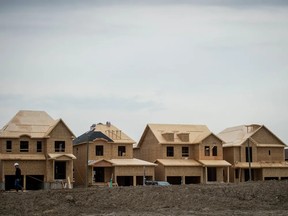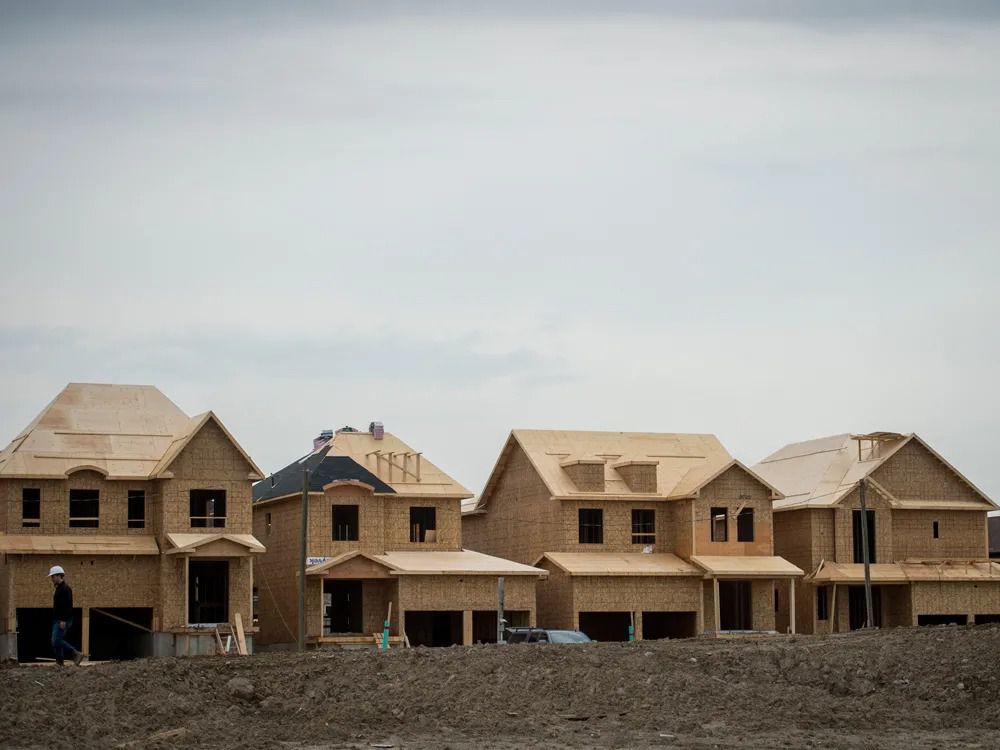New housing starts have struggled to keep up with population growth in some of Canada’s large cities

Article content
New housing starts have struggled to keep up with population growth in some of Canada’s large cities, especially Toronto, making affordability a “significant” challenge, according to the Canada Mortgage and Housing Corporation’s first in a series of reports to get a better handle on the country’s housing supply and its impact on affordability.
Advertisement 2
Article content
“The biggest issue affecting housing affordability in Canada is that supply simply isn’t keeping pace with demand,” the CMHC declared in the report, which was released Tuesday afternoon.
But the housing authority added that the situation is complex, with several reasons behind steep, continued price escalation in recent years.
“Work is currently underway at CMHC to estimate the number of housing units needed in many parts of the country in order to make the real estate market more affordable,” the housing authority said. “In addition to demographics, several economic factors are considered in this analysis, such as the effect of household income on housing demand.”
The CHMC reports over the next couple of years will focus on the country’s six largest census metropolitan areas: Toronto, Montreal, Vancouver, Calgary, Edmonton and Ottawa. They will look at trends and conduct analysis of factors including the relative growth in the housing supply per capita over time, the intensity of development including units per structure and building height, and how much new housing is apartments and rentals versus single-detached homes.
Advertisement 3
Article content
In the first report, CMHC found that apartments dominate construction in large urban centres including Montreal, Toronto, and Vancouver, where constraints such as land and bylaws are “significant” factors in pushing up land prices.
-

Ottawa’s plan to double homebuilding could lead to oversupply, experts warn
-

‘Conditions have not been this tight since 2006’: Behind the big rebound in Calgary real estate
-

CMHC says home price and sales growth to moderate but stay elevated
“Toronto prevails in the construction of high-rise apartment buildings with hundreds of units,” including those for rent or ownership, the CMHC said, noting that different types of buildings have different construction times and costs, which in turn influences affordability.
Advertisement 4
Article content
It is a different situation in Calgary, Edmonton, and Ottawa, where new supply of single-family, semi-detached, and row houses remains strong.
Calgary experienced the strongest expansion of housing starts in 2021, with a surge in construction of both single-detached homes and apartments combining to push housing starts up 63 per cent from the year before. Though some of the increase was attributable to slower construction in the first year of the pandemic, declining inventories and strong demand also played a role in the expansion, the CMHC report said.
Vancouver stood out as the only city where single-detached construction declined last year, slipping 2.3 per cent. High apartments construction drove overall housing starts up 16 per cent in British Columbia’s largest city.
Advertisement 5
Article content
“This is an ongoing trend that developed over the past decade due to high land prices rendering new single-detached development largely uneconomical,” the housing authority said.
Apartment construction was also active in Montreal, which registered its highest pace of housing starts in over three decades. The CMHC said prices (or rents) and demand both accelerated.
Toronto, Canada’s largest metropolitan area, added the most housing units in 2021 in absolute terms, up nine per cent from a year earlier. However, the CMHC noted that this did not translate to the most units relative to its population.
Toronto, Montreal, and Ottawa generally have the lowest levels of residential construction per capita, measured as housing starts per 10,000 people. But Toronto, contrary to the other two cities, has shown a slight downward trend in this ratio for the past few years, the CMHC report said.
Advertisement 6
Article content
“This indicates that, despite a high number of housing starts, construction has not been sufficient to keep pace with population growth,” the housing authority said, noting that this situation “has certainly not helped reduce affordability problems” in Toronto and the surrounding area.
Both the federal and Ontario governments included promises to address housing affordability and construction in budgets delivered last month.
Avery Shenfeld, chief economist at CIBC Capital Markets, said the CMHC report joins a “chorus of other studies that have identified a shortfall in supply as a key factor in driving house prices higher.” And while there are remedies in the works, such as changes to zoning and approval processes, it won’t be an easy fix.
Advertisement 7
Article content
“In the near term we’re dealing with a tight supply of skilled construction workers that could limit our ability to ramp up the pace of building,” Shenfeld said.
Bob Schickedanz, president of the Ontario Home Builders’ Association, said the new home construction industry faces challenges including access to land, labour, infrastructure, and supplies.
“The province anticipates 2.27 million more people to call Ontario home in the next ten years and it’s an economic and social imperative that we have the resources, and development approvals system in place which is needed to construct at least one million homes in the next decade to meet this anticipated demand,” he said.
• Email: bshecter@postmedia.com | Twitter: BatPost


